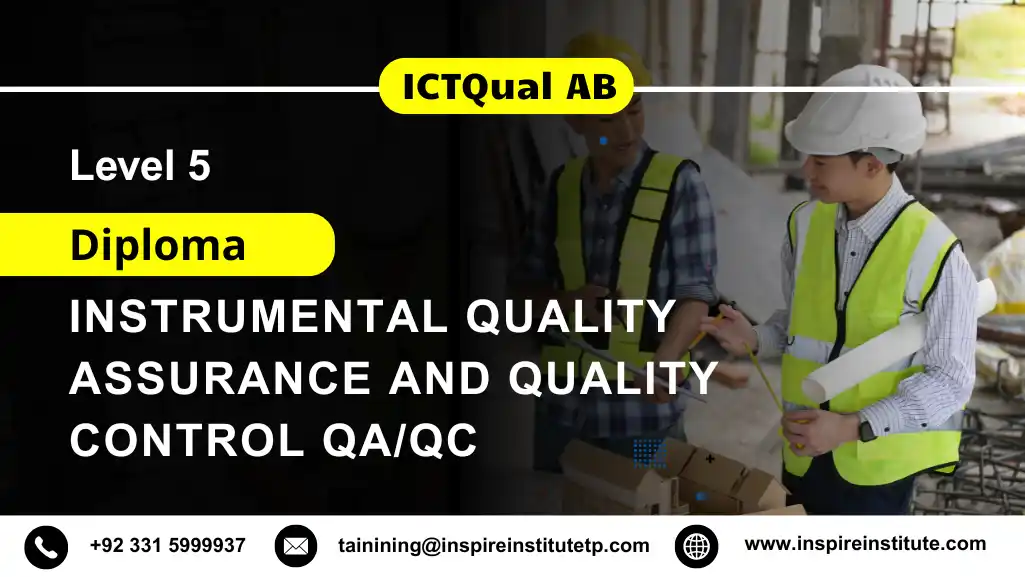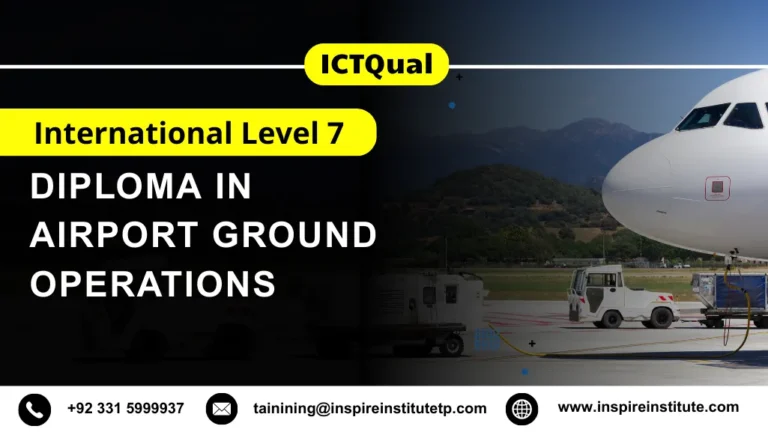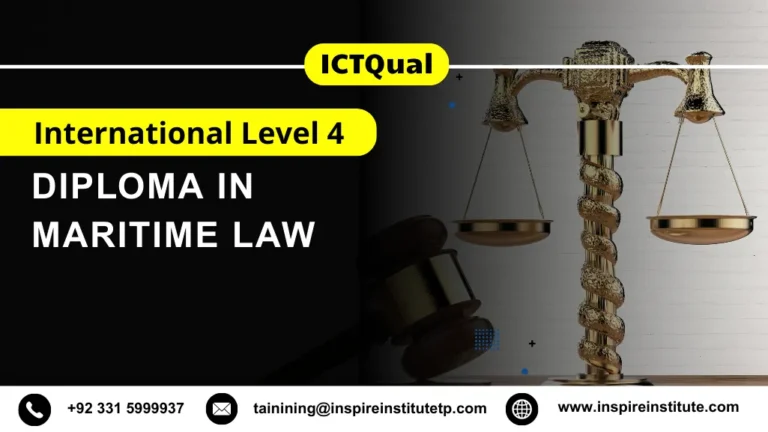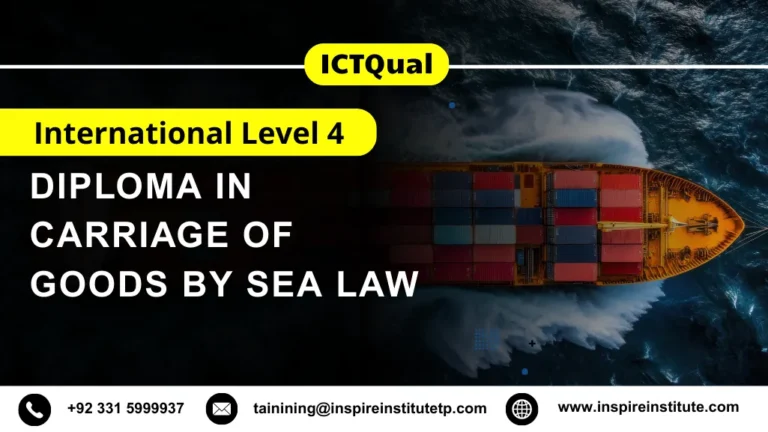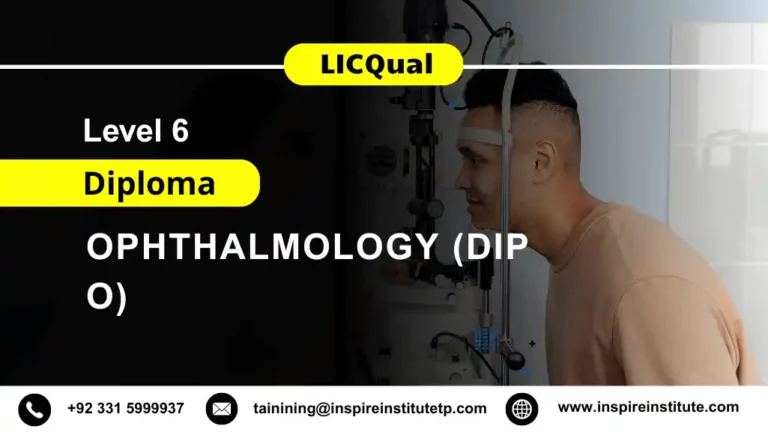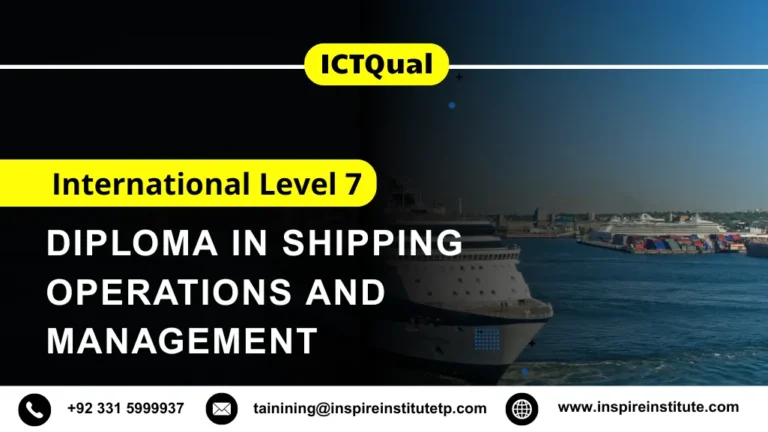ICTQual AB Level 5 Diploma in Instrumental Quality Assurance and Quality Control QA/QC
The ICTQual AB Level 5 Diploma in Instrumental Quality Assurance and Quality Control (QA/QC) is a prestigious, UK-accredited qualification designed for professionals seeking advanced expertise in industrial quality systems, instrumentation management, and compliance assurance. In today’s global industries—where precision, reliability, and safety are paramount—this qualification provides learners with the technical and analytical capabilities required to manage, evaluate, and improve quality systems across complex industrial operations.
This course focuses on equipping learners with advanced skills instrumentation calibration, process validation, inspection management, and quality auditing. It bridges the gap between practical field experience and strategic quality leadership by providing a comprehensive understanding of QA/QC frameworks, international standards (including ISO 9001 and ISO 17025), and advanced control methodologies. Through rigorous training, learners develop the ability to identify, assess, and resolve quality challenges in dynamic industrial environments.
The ICTQual AB Level 5 Diploma in Instrumental QA/QC integrates both theoretical and practical dimensions of quality assurance. Learners engage in real-world simulations, research-based projects, and case studies that enhance their decision-making, problem-solving, and project management abilities. The program Quality Control also focuses on developing proficiency in documentation, auditing, and regulatory compliance—skills essential for maintaining operational excellence and certification readiness in industrial facilities.
A key strength of this diploma lies in its alignment with industry standards and professional expectations. The curriculum is designed to reflect the latest advancements in industrial instrumentation, automation technologies, and data-driven quality control. By mastering these principles, learners gain the competence to manage large-scale inspection programs, oversee calibration systems, and implement sustainable quality improvement initiatives.
Why Choose this Qualification
The ICTQual AB Level 5 Diploma in Instrumental Quality Assurance and Quality Control (QA/QC) stands as a globally recognised qualification that prepares learners to take on advanced technical and managerial responsibilities within industrial quality management systems. Designed with a balance of theoretical knowledge and applied expertise, this programme provides the perfect platform for professionals aiming to lead, innovate, and ensure excellence in QA/QC operations. It enables Quality Control learners to master the processes that govern quality compliance, inspection, and instrumentation across various industrial sectors such as oil and gas, power generation, manufacturing, and engineering services.
Key Reasons to Choose This Qualification:
Advanced Technical Expertise
This qualification offers an in-depth understanding of advanced instrumentation and quality assurance principles.
- Gain expertise in calibration, inspection, and testing of complex industrial systems.
- Learn advanced QA/QC methodologies aligned with ISO 9001 and ISO 17025 standards.
- Understand how to design, implement, and monitor quality management systems.
- Develop the ability to analyse measurement data and improve process accuracy.
Practical Industry Application
Learners develop essential hands-on experience to meet real-world industry demands.
- Engage in project-based assignments and case studies simulating industrial QA/QC environments.
- Apply techniques in fault diagnosis, system verification, and performance assessment.
- Conduct inspections and audits using industry-approved standards and tools Quality Control .
- Build practical capabilities for managing calibration, compliance, and testing schedules.
International Recognition and Credibility
The diploma is globally respected, reflecting UK-based quality education standards.
- Earn a qualification recognised by employers across global industrial sectors.
- Enhance employability with an internationally accredited QA/QC credential.
- Build professional credibility within quality management and inspection fields.
- Strengthen opportunities for overseas employment in oil and gas, construction, and manufacturing industries.
Leadership and Management Development
This course prepares learners for leadership roles in QA/QC and instrumentation.
- Develop management skills to lead inspection and quality teams effectively.
- Learn how to design and execute quality assurance strategies across departments.
- Strengthen decision-making abilities through analytical and evidence-based approaches.
- Gain confidence to manage compliance, reporting, and continuous improvement projects.
Evidence-Based Quality Practices
The qualification promotes precision and accountability through data-driven learning.
- Use quality metrics to identify gaps and drive performance improvements.
- Learn to collect, interpret, and present QA/QC data effectively.
- Understand how to implement corrective and preventive actions based on analysis.
- Apply measurable techniques for maintaining international quality compliance.
Flexible and Career-Focused Learning
The ICTQual AB Level 5 Diploma supports working professionals with flexible study options.
- Study through assignment-based modules that suit your professional schedule.
- Balance work, study, and personal commitments effectively.
- Receive continuous academic and tutor support for successful learning outcomes.
- Access modern digital resources and learning tools for practical skill development.
Career Advancement Opportunities
Completing this diploma significantly enhances professional growth and employability.
- Qualify for senior positions such as QA/QC Engineer, Quality Manager, or Inspection Coordinator.
- Expand your expertise for career progression into higher-level industrial management.
- Gain skills relevant to multiple sectors, from energy and petrochemicals to engineering services.
- Build a pathway towards higher education, including Level 6 or 7 diplomas or degree programmes.
Contribution to Organisational Excellence
Graduates play a crucial role in improving quality, efficiency, and reliability within industries.
- Learn to implement sustainable quality control frameworks.
- Drive process optimisation and waste reduction initiatives.
- Promote compliance with safety, environmental, and quality regulations.
- Strengthen overall operational performance through systematic quality management.
The ICTQual AB Level 5 Diploma in Instrumental Quality Assurance and Quality Control (QA/QC) empowers learners to combine technical mastery with strategic quality management skills. It is an ideal qualification Quality Control for individuals aiming to advance into senior QA/QC or leadership roles, ensuring measurable improvement in industrial performance and global recognition as a quality professional.
Course Overview
UK based Qualification
Study Units: 6 Units
Evidence & Assignment Based
Course Level: Level 5
Qualification Structure
This qualification, the ICTQual AB Level 5 Diploma in Instrumental Quality Assurance and Quality Control QA/QC, consists of 6 mandatory units.
- Advanced ITP Development and Multi‑Stage Inspections
- Comprehensive Use of Checklists for QA/QC Audits
- Advanced Material Preservation and Traceability Systems
- Detailed Application of NEC/NEMA Standards in Instrumentation Projects
- Instrument Tubing, Junction Boxes, and Cabinets – Inspection and Compliance
- Advanced Testing, Loop Checking, and Commissioning of Instrument Systems
Who Should Take This Course
The ICTQual AB Level 5 Diploma in Instrumental Quality Assurance and Quality Control (QA/QC) is designed for individuals seeking to advance their careers in industrial instrumentation, inspection, and quality management. This Quality Control qualification suits professionals who aim to develop advanced technical, analytical, and supervisory competencies essential for maintaining quality, accuracy, and compliance in engineering and industrial operations. The course Quality Control blends theory with practical application, making it an ideal choice for those aspiring to leadership and specialist QA/QC roles in sectors such as oil and gas, power generation, manufacturing, and process control industries.
This Course Is Suitable For
Engineering and Technical Professionals
This qualification is ideal for engineering and technical professionals who want to upgrade their knowledge in quality assurance and instrumentation systems.
- Learn advanced principles of industrial instrumentation and control systems.
- Gain in-depth understanding of inspection procedures and calibration standards.
- Enhance your ability to analyse technical specifications and maintain equipment accuracy.
- Strengthen professional competence to ensure compliance with industry quality frameworks.
Quality Control and Quality Assurance Inspectors
Professionals involved in QA/QC operations will benefit from enhanced skills and practical techniques.
- Develop proficiency in applying quality control methodologies and auditing standards.
- Gain expertise in documentation, reporting, and non-conformance management.
- Improve inspection accuracy using industry-approved instruments and measurement tools.
- Learn how to ensure adherence to ISO, IEC, and other international quality standards.
Supervisors and Managers in Industrial Operations
This course supports supervisory and managerial professionals aiming to lead QA/QC teams effectively.
- Acquire leadership skills to manage quality assurance and inspection departments.
- Learn to develop and implement strategic quality management systems.
- Gain the ability to train and evaluate technical staff for performance improvement.
- Build decision-making and problem-solving abilities for operational excellence.
Graduates in Engineering and Technology
Recent graduates can use this qualification as a bridge to enter the professional QA/QC sector.
- Develop applied technical and analytical skills required for quality inspection roles.
- Understand real-world industrial systems and calibration processes.
- Gain an internationally recognised diploma to strengthen your employability profile.
- Build a solid foundation for progressing toward Level 6 or degree-level qualifications.
Professionals in Oil, Gas, and Process Industries
The course is well-suited for professionals working in oil and gas, refineries, and process control industries.
- Learn to manage instrumentation and process quality across complex industrial plants.
- Enhance skills in system testing, equipment reliability, and quality compliance.
- Gain exposure to quality control practices specific to energy and petrochemical sectors.
- Apply QA/QC principles to reduce operational risks and enhance safety.
Maintenance and Calibration Technicians
Technicians responsible for equipment calibration and maintenance will find this course highly beneficial.
- Strengthen technical competence in inspection and calibration procedures.
- Understand fault diagnosis, preventive maintenance, and quality documentation.
- Learn to verify instrument performance using advanced measurement systems.
- Gain the ability to maintain traceability and conformity in calibration operations.
Professionals Seeking Career Advancement
Individuals aspiring for senior-level QA/QC positions can use this diploma for professional growth.
- Improve your credentials for roles such as QA/QC Engineer, Quality Manager, or Audit Lead.
- Acquire strategic knowledge to manage large-scale quality operations.
- Learn to apply data-driven decision-making for continuous process improvement.
- Build a professional profile that meets global quality management standards.
Individuals Transitioning into the QA/QC Field
This diploma is also ideal for professionals from related technical disciplines aiming to enter the QA/QC sector.
- Gain comprehensive knowledge of industrial quality management and control systems.
- Learn transferable skills applicable across multiple engineering sectors.
- Develop the confidence to perform QA/QC functions in diverse industrial environments.
- Build competency to meet employer expectations for technical and quality leadership roles.
The ICTQual AB Level 5 Diploma in Instrumental Quality Assurance and Quality Control (QA/QC) is a strategic qualification for professionals at all stages of their career—whether entering the field, upgrading their expertise, or moving into leadership roles. By completing this diploma Quality Control , learners gain the technical, analytical, and managerial skills essential to achieving excellence in industrial QA/QC practices and advancing in today’s competitive global market.g a meaningful contribution to innovation, economic growth, and society at both national and global levels.
Course Benefits
The ICTQual AB Level 5 Diploma in Instrumental Quality Assurance and Quality Control (QA/QC) is a highly advanced qualification designed for professionals who aim to master the principles and practices of industrial quality management and instrumentation. This diploma Quality Control deepens learners’ expertise in QA/QC systems, inspection methodologies, and global compliance frameworks. It enables participants to take strategic responsibility for maintaining precision, reliability, and quality consistency across industrial processes. Ideal for experienced professionals and aspiring quality managers, this qualification blends theoretical rigour with hands-on application to develop the skills required to lead and innovate in the field of quality assurance and control.
Key Benefits of the Course
Specialist Knowledge
- The ICTQual AB Level 5 Diploma in Instrumental QA/QC provides learners with advanced and specialised knowledge of industrial instrumentation and quality management systems.
- The course focuses on complex QA/QC frameworks, calibration management, precision measurement, and performance evaluation in line with global industrial standards. Learners gain expertise in implementing quality assurance strategies aligned with ISO 9001, ISO 17025, and IEC standards.
- This in-depth understanding equips graduates to analyse, design, and manage quality processes that enhance system performance and operational excellence across multiple industrial environments.
Practical Application
- This diploma places a strong emphasis on applied learning, bridging the gap between theory and industrial practice. Learners engage in advanced assignments, simulations, and real-world projects to refine their technical and analytical capabilities.
- The course trains participants to conduct detailed inspections, calibration audits, and performance analyses while managing documentation and compliance effectively Quality Control.
- Through problem-solving activities and process assessments, learners develop practical expertise that enables them to improve product reliability, minimise errors, and enhance operational efficiency in complex industrial systems.
Recognised Qualification
- The ICTQual AB Level 5 Diploma in Instrumental Quality Assurance and Quality Control (QA/QC) is a UK-accredited and internationally recognised qualification that validates high-level technical competence.
- It is respected globally by employers across industries such as oil and gas, construction, power generation, manufacturing, and automation.
- This qualification demonstrates that graduates possess advanced QA/QC proficiency, leadership potential, and the ability to align processes with global standards. Recognition at this level enhances professional credibility and opens doors to international employment and advancement opportunities.
Flexible Learning Pathway
- Designed with professionals and aspiring QA/QC leaders in mind, this course offers a flexible, assignment-based structure that accommodates both working learners and full-time students. Participants benefit from a self-paced learning model that integrates academic content with professional experience.
- The flexibility allows learners to manage their studies alongside work commitments while still gaining comprehensive support from expert tutors and access to digital resources. This adaptable approach encourages independent learning, critical evaluation, and applied knowledge transfer into workplace settings.
Evidence-Based Training
- The qualification focuses on evidence-based learning to ensure data-driven quality management practices. Learners are trained to use advanced inspection instruments, statistical tools, and analytical software to evaluate and verify performance parameters.
- ‘The programme enhances the ability to interpret quality data, identify deviations, and apply corrective actions that improve system integrity. By mastering quantitative and qualitative analysis methods, participants develop the competence to maintain compliance, ensure precision, and implement continuous improvement strategies that meet international standards of QA/QC excellence.
Career Development
- Graduates of the ICTQual AB Level 5 Diploma in Instrumental QA/QC are well-positioned for senior technical and leadership roles such as Quality Engineer, QA/QC Manager, Inspection Coordinator, or Process Improvement Specialist.
- The qualification prepares learners to handle high-level responsibilities involving process validation, auditing, and team management. It also provides a pathway for progression into higher-level academic or professional qualifications, including the ICTQual AB Level 6 Diploma in Instrumental QA/QC or equivalent certifications. The course enhances employability and supports long-term professional success in the global industrial quality sector.
Enhanced Operational Impact
- Learners are trained to optimise industrial performance by implementing advanced QA/QC methodologies and continuous improvement systems. The programme develops a deep understanding of operational efficiency, safety, and reliability, enabling participants to identify potential process risks and introduce sustainable corrective measures.
- This training ensures that graduates can significantly enhance productivity, maintain compliance with international standards, and support organisations in achieving measurable quality and performance outcomes.
Professional Growth
- Beyond technical excellence, the diploma strengthens essential professional attributes such as leadership, communication, teamwork, and decision-making. Learners develop critical thinking and analytical reasoning skills to solve complex industrial challenges.
- The course fosters confidence in managing multidisciplinary QA/QC operations and promotes lifelong learning, ensuring professionals remain adaptable to evolving technologies and quality standards.
- This well-rounded growth positions graduates as influential leaders in industrial quality management.
The ICTQual AB Level 5 Diploma in Instrumental Quality Assurance and Quality Control (QA/QC) stands as a benchmark of professional excellence and technical mastery. It provides Quality Control learners with a comprehensive understanding of quality management principles, advanced instrumentation techniques, and leadership capabilities necessary to drive industrial innovation and maintain global quality standards. Completing this qualification empowers professionals to make a lasting impact on their organisations while advancing their careers in the dynamic field of QA/QC.
Eligibility Criteria
The ICTQual AB Level 5 Diploma in Instrumental Quality Assurance and Quality Control (QA/QC) is designed for learners who aspire to enhance their professional capabilities in industrial quality management and instrumentation systems. This qualificationQuality Control is ideal for individuals with prior experience or education in QA/QC, engineering, or industrial operations who wish to progress into senior or supervisory roles.
Age Requirements
Applicants must be at least 20 years old at the time of enrolment. This minimum age requirement ensures learners have attained a suitable level of maturity and professional awareness to engage effectively with the advanced technical and analytical content of the qualification.
Educational Requirements
Learners should have completed a Level 4 qualification or an equivalent diploma in a related discipline such as Instrumentation, Engineering, Quality Control, or Industrial Technology. Candidates with a recognised certification or diploma in QA/QC, such as the ICTQual AB Level 4 Diploma in Instrumental Quality Assurance and Quality Control (QA/QC), are strongly encouraged to apply as it provides a solid foundation for this advanced level.
Professional Experience
While not mandatory, it is highly recommended that learners possess relevant professional experience in industrial sectors such as oil and gas, manufacturing, power generation, construction, or automation. Experience in roles involving inspection, instrumentation, or quality control will support a deeper understanding of the course materials and practical applications of QA/QC principles.
English Language Proficiency
Since the course is delivered in English, learners are expected to have a strong command of written and spoken English. Applicants whose first language is not English should demonstrate proficiency through qualifications such as IELTS (minimum score of 5.5) or equivalent, or through prior education and work experience in an English-speaking environment. This ensures that learners can effectively engage with coursework, reports, and assessments.
Future Progression
The ICTQual AB Level 5 Diploma in Instrumental Quality Assurance and Quality Control (QA/QC) provides learners with advanced technical knowledge and professional expertise, preparing them for higher academic achievements and progressive career growth. This qualification not only validates one’s ability to manage complex QA/QC processes but also serves as a foundation for continuous professional development and global career advancement. Learners completing this diploma Quality Control can explore multiple educational and professional pathways designed to strengthen their competence and leadership within industrial quality management.
Academic Progression
Graduates of this qualification can progress to higher-level programmes such as the ICTQual AB Level 6 Diploma in Instrumental Quality Assurance and Quality Control (QA/QC) or equivalent qualifications in industrial engineering, process management, or quality systems. These advanced courses expand learners’ expertise in analytical methodologies, quality auditing, and strategic leadership—helping them transition from technical to managerial or specialist roles within the industry.
Professional Career Opportunities
Upon completing the Level 5 Diploma, learners become eligible for senior-level positions across industrial sectors. Graduates can pursue roles such as:
- QA/QC Manager
- Quality Assurance Engineer
- Inspection Supervisor
- Calibration and Testing Specialist
- Instrumentation Quality Consultant
These positions offer increased responsibilities, allowing professionals to oversee inspection systems, implement global quality standards, and manage operational quality performance in large-scale projects.
Global Industry Recognition
The ICTQual AB Level 5 Diploma is internationally recognised, enabling graduates to work confidently across industries such as oil and gas, construction, power generation, manufacturing, and process automation. The qualification demonstrates a learner’s ability to apply QA/QC principles aligned with global standards such as ISO 9001, ISO 17025, and IEC regulations, enhancing credibility and professional mobility across international job markets.
Continuous Professional Development (CPD)
Learners can also expand their professional profile through specialised certifications, short courses, and advanced training in areas such as:
- ISO Lead Auditor Training (ISO 9001, ISO 14001, or ISO 45001)
- Advanced Instrumentation and Control Systems
- Quality Management and Auditing Techniques
- Risk Management and Compliance
These CPD opportunities ensure that graduates remain up-to-date with technological innovations and quality frameworks that shape modern industrial operations.
Pathway to Higher Qualifications and Leadership Roles
This qualification provides an excellent platform for learners aspiring to pursue higher education such as a bachelor’s or master’s degree in engineering, industrial management, or quality systems. It also prepares professionals for leadership roles where they can influence organisational quality strategies, policy development, and performance improvement initiatives. The skills and knowledge acquired through this diploma enable learners to contribute to sustainable business success and operational excellence.
The ICTQual AB Level 5 Diploma in Instrumental Quality Assurance and Quality Control (QA/QC) marks a significant milestone in professional development. It empowers learners to advance academically and professionally, positioning them as skilled experts capable of leading QA/QC operations in global industrial environments. This qualification Quality Control not only strengthens technical expertise but also opens pathways to lifelong learning and progressive career success.n and instrumentation. It empowers learners to excel in complex industrial systems, lead innovation, and achieve global recognition as skilled professionals in the engineering and process control sectors.

